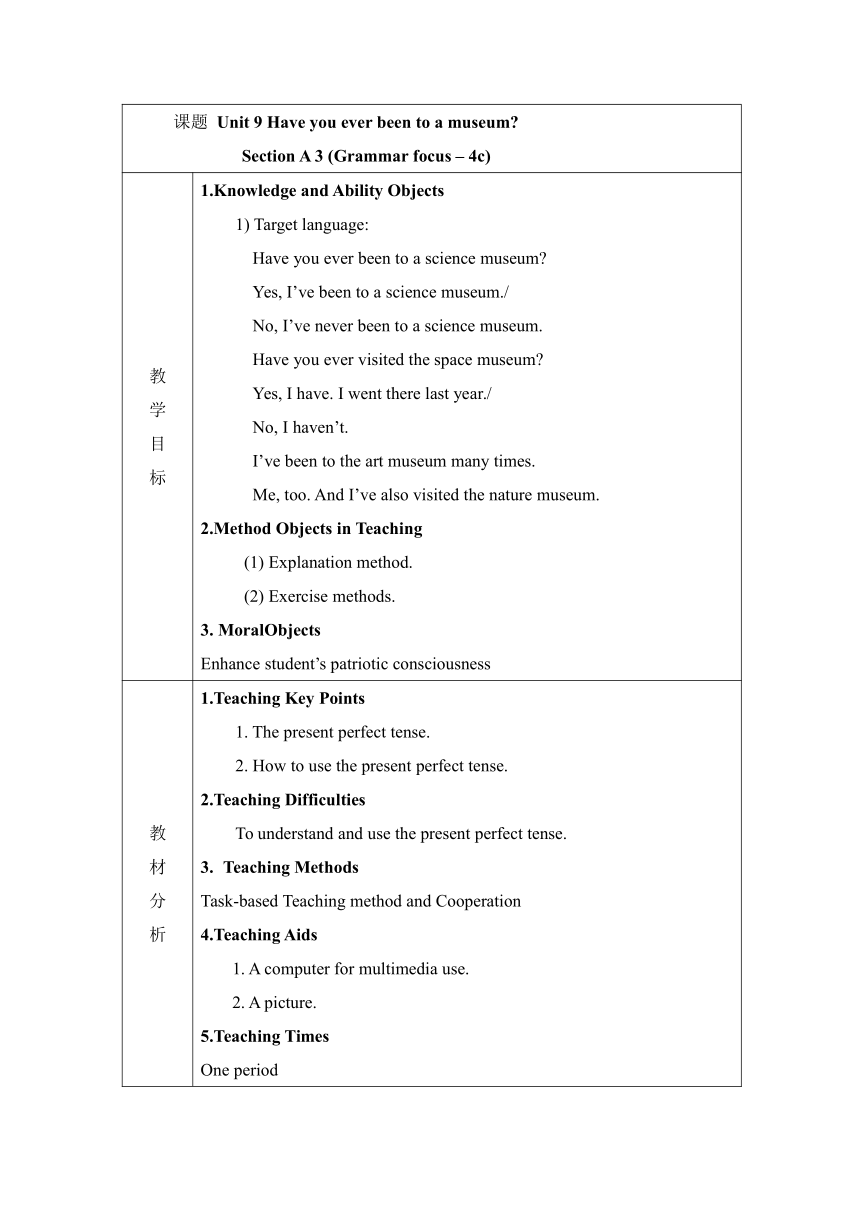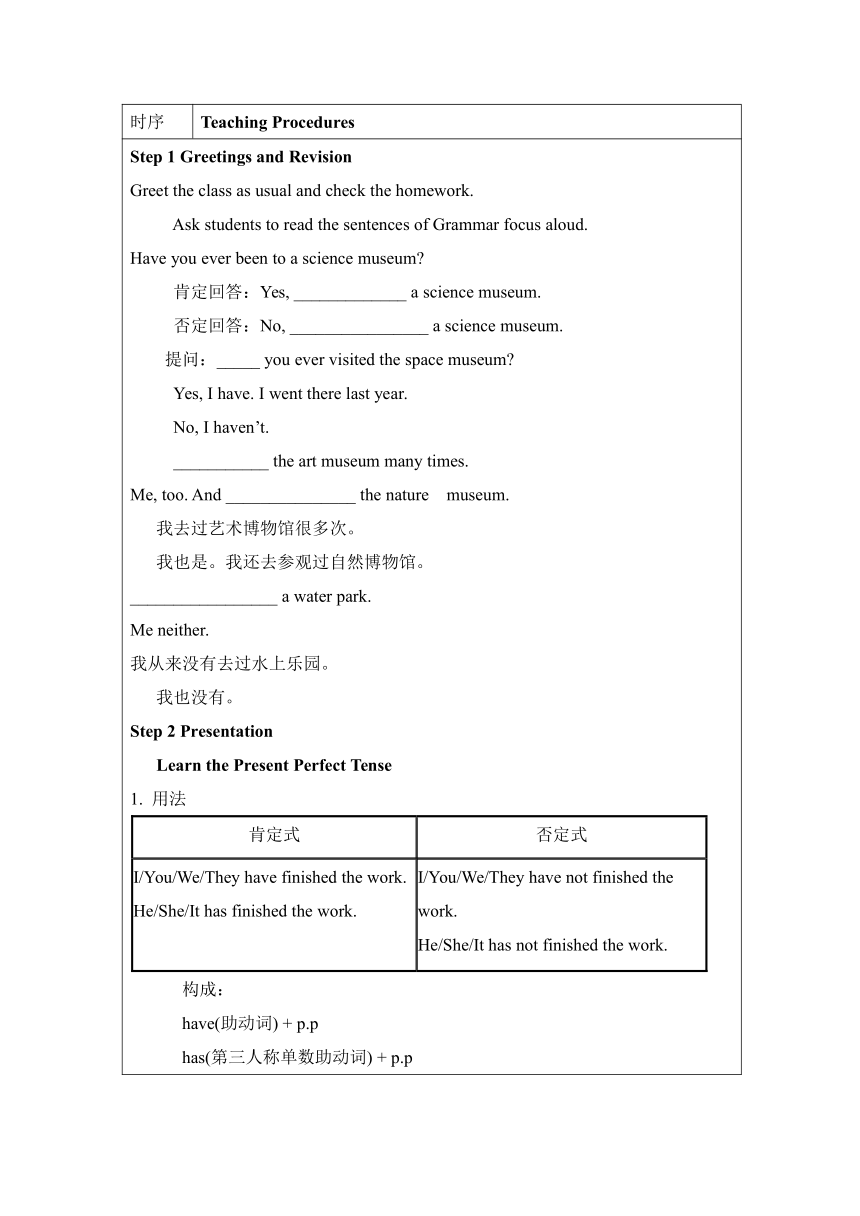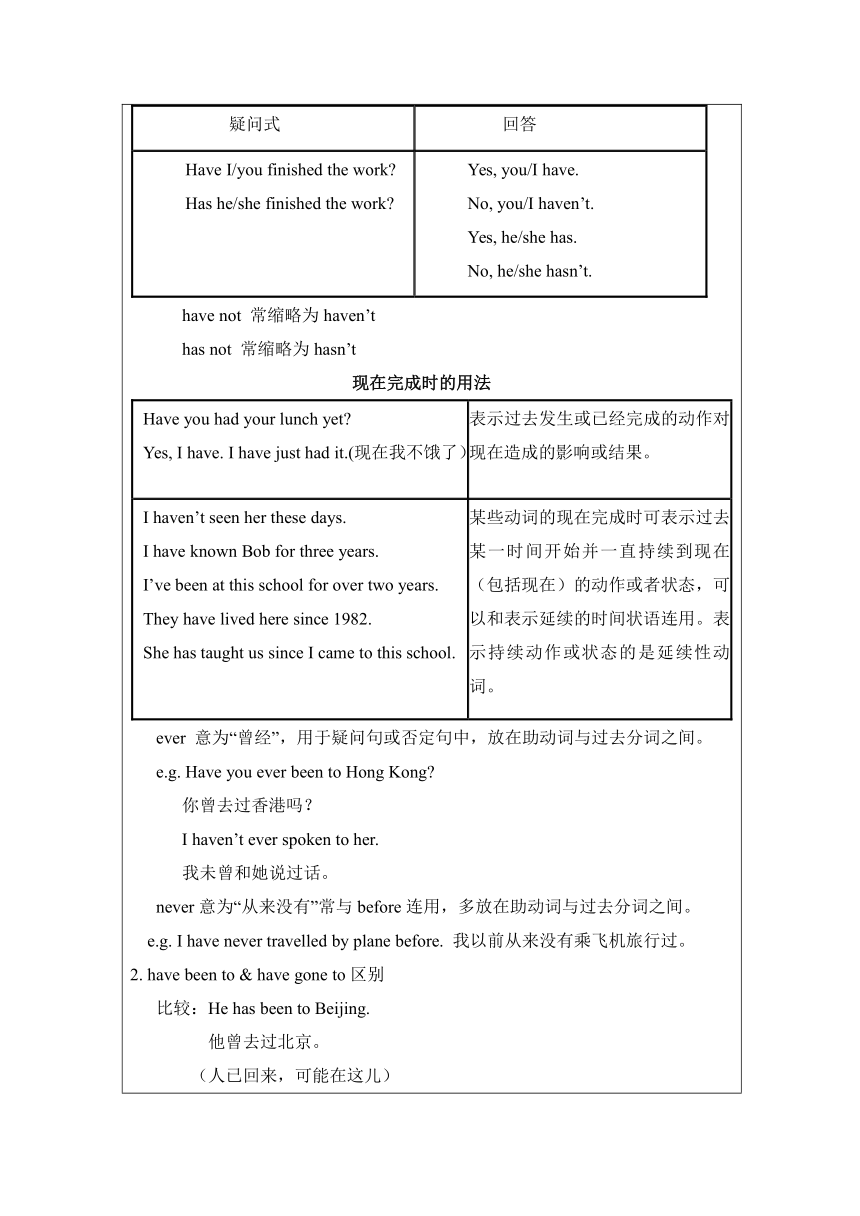Unit 9 Have you ever been to a museum? Section A (Grammar focus – 4c) 教案(表格式)
文档属性
| 名称 | Unit 9 Have you ever been to a museum? Section A (Grammar focus – 4c) 教案(表格式) |  | |
| 格式 | docx | ||
| 文件大小 | 24.4KB | ||
| 资源类型 | 教案 | ||
| 版本资源 | 人教新目标(Go for it)版 | ||
| 科目 | 英语 | ||
| 更新时间 | 2022-04-07 10:31:54 | ||
图片预览



文档简介
课题 Unit 9 Have you ever been to a museum Section A 3 (Grammar focus – 4c)
教 学 目 标 1.Knowledge and Ability Objects 1) Target language: Have you ever been to a science museum Yes, I’ve been to a science museum./ No, I’ve never been to a science museum. Have you ever visited the space museum Yes, I have. I went there last year./ No, I haven’t. I’ve been to the art museum many times. Me, too. And I’ve also visited the nature museum. 2.Method Objects in Teaching (1) Explanation method. (2) Exercise methods. 3. MoralObjects Enhance student’s patriotic consciousness
教 材 分 析 1.Teaching Key Points 1. The present perfect tense. 2. How to use the present perfect tense. 2.Teaching Difficulties To understand and use the present perfect tense. Teaching Methods Task-based Teaching method and Cooperation 4.Teaching Aids 1. A computer for multimedia use. 2. A picture. 5.Teaching Times One period
时序 Teaching Procedures
Step 1 Greetings and Revision Greet the class as usual and check the homework. Ask students to read the sentences of Grammar focus aloud. Have you ever been to a science museum 肯定回答:Yes, _____________ a science museum. 否定回答:No, ________________ a science museum. 提问:_____ you ever visited the space museum Yes, I have. I went there last year. No, I haven’t. ___________ the art museum many times. Me, too. And _______________ the nature museum. 我去过艺术博物馆很多次。 我也是。我还去参观过自然博物馆。 _________________ a water park. Me neither. 我从来没有去过水上乐园。 我也没有。 Step 2 Presentation Learn the Present Perfect Tense 1. 用法 肯定式否定式I/You/We/They have finished the work. He/She/It has finished the work.I/You/We/They have not finished the work. He/She/It has not finished the work.
构成: have(助动词) + p.p has(第三人称单数助动词) + p.p 疑问式回答Have I/you finished the work Has he/she finished the work Yes, you/I have. No, you/I haven’t. Yes, he/she has. No, he/she hasn’t.
have not 常缩略为haven’t has not 常缩略为hasn’t 现在完成时的用法 Have you had your lunch yet Yes, I have. I have just had it.(现在我不饿了)表示过去发生或已经完成的动作对现在造成的影响或结果。I haven’t seen her these days. I have known Bob for three years. I’ve been at this school for over two years. They have lived here since 1982. She has taught us since I came to this school. 某些动词的现在完成时可表示过去某一时间开始并一直持续到现在(包括现在)的动作或者状态,可以和表示延续的时间状语连用。表示持续动作或状态的是延续性动词。
ever 意为“曾经”,用于疑问句或否定句中,放在助动词与过去分词之间。 e.g. Have you ever been to Hong Kong 你曾去过香港吗?
I haven’t ever spoken to her. 我未曾和她说过话。 never意为“从来没有”常与before连用,多放在助动词与过去分词之间。 e.g. I have never travelled by plane before. 我以前从来没有乘飞机旅行过。 2. have been to & have gone to区别 比较:He has been to Beijing. 他曾去过北京。 (人已回来,可能在这儿) He has gone to Beijing. 他已经去北京了。 (人已走,不在这儿了)。 have / has been (to) 表示“曾经到过某地”,说话时此人不在那里,已经回来。侧重指经历。 have / has gone (to) 表示某人“已经去某地了”,说话时此人可能在路上或已到那里,反正不在这里。 3. 一般过去时与现在完成时的区别 比较:I have seen the film.. 我看过这部电影。 (我了解这部电影的内容) I saw the film last month. 我上个月看了这部电影。 (只说明上星期看了这部电影,不涉及现在情况) ①一般过去时只强调过去的动作;现在完成时强调过去的事情对现在的影响。 ②一般过去时通常与表示过去的时间状语连用;现在完成时则不能与表示过去的时间状语连用。 ③一般过去时单纯表示过去的经历;现在完成时表示过去的动作或状态延续到现在并可能持续下去。 一般过去时的时间状语有:yesterday, last week,…ago, in1980, in October, just now… 共同的时间状语有:this morning, tonight, this summer, before, already,… 现在完成时的时间状语有:for, since, ever, never, just, already, yet, in past years, … Step 3 Exercises 1. Finish exercises. I. 根据括号内的要求完成下列各句,每空一词(含缩写)。 1. My parents have come back already. (改为否定句) My parents _______ ______ back ____. 2. The boys have been to Japan lots of times. (改为一般疑问句) _______ the boys _______ to Japan lots of times 3. Has your sister gone to the bookstore (作肯定回答) _______, she _______. 4. I have been to the theme park threetimes. (对划线部分提问) _____ ______ times have you been to the theme park 5. The movie has been on for half an hour. (对划线部分提问) _____ _______ has the movie been on Ⅱ. 根据括号中所给动词的提示完成下列句子或对话。 1. I ____________________ (work) in this city for 7 years. 2. — How long ______ she ______ (live) here — Since she ______ (get) a new job here. 3. How many words _____ you ______________ (learn) since two years ago 4. My mother ____ never ________ (hear) of this man. 5. Tom _________(be) to China twice. 2. Finish 4a on textbook. Put the correct form of the verbs in the blanks. 1. A: Do you want ________ (come) to the space museum B: No, I’ve already ______ (be) there three times. 2. A: Have you _____ (see) the robots at the science museum B: Yes, I _____ (go) there last weekend. 3. A: Let’s _______ (spend) the day at the zoo. B: Well, I’ve already ______ (be) there a couple of times, but I’m happy _______ (go) again. 4. A: How about ______ (go) to the art museum There are some special German paintings there right now. B: Sure. When do you want _____ (go) 5. A: Have you ever _______ (visit) the history museum B: No, I’ve never ______ (be) there. 3. Finish 4b on textbook. Fill in the blanks with the correct forms of the verbs in brackets. Most of us ____________ (see) Mickey Mouse, Donald Duck and other famous Disney characters in cartoons before. But have you ever ______ (be) to Disneyland Disneyland ______ (be) an amusement park with a special theme — Disney characters and movies. There _____ (be) many exciting rides, lovely restaurants and fantastic gift shops there. You can also _____ (see) the Disney characters walking around the park. And have you ever _______ (hear) of a Disney Cruise This ______ (be) a boat ride with a Disney theme. You can ______ (take) a ride on the boat for several days and eat and sleep on it. On the boat, you can ______ (shop) and have Disney parties before you ________ (arrive) at the Disney island. Step 4Consolidation Finish 4c on textbook. Answer the survey questions and then ask your partner. Have you ever ...YouYour partnerbeen to another province in China lost something important
Step5 Summary Today we have mainly learned the usage of present perfect tense. We also did some exercises to consolidate the knowledge and mastered how to talk about experiences. Step 6 Homework Remember the grammar in this lesson. Finish the exercise in the workbook. Step 7 Blackboard Design Unit 9 Have you ever been to a museum Section A 3 (Grammar focus – 4c) I/You/We/They have finished the work. I/You/We/They have not finished thework Have I/you finished the work Has he/she finished the work Yes, you/I have. No, you/I haven’t. Yes, he/she has. No, he/she hasn’t. G1 G2 G3 G4 Step8 Feed back
教 学 目 标 1.Knowledge and Ability Objects 1) Target language: Have you ever been to a science museum Yes, I’ve been to a science museum./ No, I’ve never been to a science museum. Have you ever visited the space museum Yes, I have. I went there last year./ No, I haven’t. I’ve been to the art museum many times. Me, too. And I’ve also visited the nature museum. 2.Method Objects in Teaching (1) Explanation method. (2) Exercise methods. 3. MoralObjects Enhance student’s patriotic consciousness
教 材 分 析 1.Teaching Key Points 1. The present perfect tense. 2. How to use the present perfect tense. 2.Teaching Difficulties To understand and use the present perfect tense. Teaching Methods Task-based Teaching method and Cooperation 4.Teaching Aids 1. A computer for multimedia use. 2. A picture. 5.Teaching Times One period
时序 Teaching Procedures
Step 1 Greetings and Revision Greet the class as usual and check the homework. Ask students to read the sentences of Grammar focus aloud. Have you ever been to a science museum 肯定回答:Yes, _____________ a science museum. 否定回答:No, ________________ a science museum. 提问:_____ you ever visited the space museum Yes, I have. I went there last year. No, I haven’t. ___________ the art museum many times. Me, too. And _______________ the nature museum. 我去过艺术博物馆很多次。 我也是。我还去参观过自然博物馆。 _________________ a water park. Me neither. 我从来没有去过水上乐园。 我也没有。 Step 2 Presentation Learn the Present Perfect Tense 1. 用法 肯定式否定式I/You/We/They have finished the work. He/She/It has finished the work.I/You/We/They have not finished the work. He/She/It has not finished the work.
构成: have(助动词) + p.p has(第三人称单数助动词) + p.p 疑问式回答Have I/you finished the work Has he/she finished the work Yes, you/I have. No, you/I haven’t. Yes, he/she has. No, he/she hasn’t.
have not 常缩略为haven’t has not 常缩略为hasn’t 现在完成时的用法 Have you had your lunch yet Yes, I have. I have just had it.(现在我不饿了)表示过去发生或已经完成的动作对现在造成的影响或结果。I haven’t seen her these days. I have known Bob for three years. I’ve been at this school for over two years. They have lived here since 1982. She has taught us since I came to this school. 某些动词的现在完成时可表示过去某一时间开始并一直持续到现在(包括现在)的动作或者状态,可以和表示延续的时间状语连用。表示持续动作或状态的是延续性动词。
ever 意为“曾经”,用于疑问句或否定句中,放在助动词与过去分词之间。 e.g. Have you ever been to Hong Kong 你曾去过香港吗?
I haven’t ever spoken to her. 我未曾和她说过话。 never意为“从来没有”常与before连用,多放在助动词与过去分词之间。 e.g. I have never travelled by plane before. 我以前从来没有乘飞机旅行过。 2. have been to & have gone to区别 比较:He has been to Beijing. 他曾去过北京。 (人已回来,可能在这儿) He has gone to Beijing. 他已经去北京了。 (人已走,不在这儿了)。 have / has been (to) 表示“曾经到过某地”,说话时此人不在那里,已经回来。侧重指经历。 have / has gone (to) 表示某人“已经去某地了”,说话时此人可能在路上或已到那里,反正不在这里。 3. 一般过去时与现在完成时的区别 比较:I have seen the film.. 我看过这部电影。 (我了解这部电影的内容) I saw the film last month. 我上个月看了这部电影。 (只说明上星期看了这部电影,不涉及现在情况) ①一般过去时只强调过去的动作;现在完成时强调过去的事情对现在的影响。 ②一般过去时通常与表示过去的时间状语连用;现在完成时则不能与表示过去的时间状语连用。 ③一般过去时单纯表示过去的经历;现在完成时表示过去的动作或状态延续到现在并可能持续下去。 一般过去时的时间状语有:yesterday, last week,…ago, in1980, in October, just now… 共同的时间状语有:this morning, tonight, this summer, before, already,… 现在完成时的时间状语有:for, since, ever, never, just, already, yet, in past years, … Step 3 Exercises 1. Finish exercises. I. 根据括号内的要求完成下列各句,每空一词(含缩写)。 1. My parents have come back already. (改为否定句) My parents _______ ______ back ____. 2. The boys have been to Japan lots of times. (改为一般疑问句) _______ the boys _______ to Japan lots of times 3. Has your sister gone to the bookstore (作肯定回答) _______, she _______. 4. I have been to the theme park threetimes. (对划线部分提问) _____ ______ times have you been to the theme park 5. The movie has been on for half an hour. (对划线部分提问) _____ _______ has the movie been on Ⅱ. 根据括号中所给动词的提示完成下列句子或对话。 1. I ____________________ (work) in this city for 7 years. 2. — How long ______ she ______ (live) here — Since she ______ (get) a new job here. 3. How many words _____ you ______________ (learn) since two years ago 4. My mother ____ never ________ (hear) of this man. 5. Tom _________(be) to China twice. 2. Finish 4a on textbook. Put the correct form of the verbs in the blanks. 1. A: Do you want ________ (come) to the space museum B: No, I’ve already ______ (be) there three times. 2. A: Have you _____ (see) the robots at the science museum B: Yes, I _____ (go) there last weekend. 3. A: Let’s _______ (spend) the day at the zoo. B: Well, I’ve already ______ (be) there a couple of times, but I’m happy _______ (go) again. 4. A: How about ______ (go) to the art museum There are some special German paintings there right now. B: Sure. When do you want _____ (go) 5. A: Have you ever _______ (visit) the history museum B: No, I’ve never ______ (be) there. 3. Finish 4b on textbook. Fill in the blanks with the correct forms of the verbs in brackets. Most of us ____________ (see) Mickey Mouse, Donald Duck and other famous Disney characters in cartoons before. But have you ever ______ (be) to Disneyland Disneyland ______ (be) an amusement park with a special theme — Disney characters and movies. There _____ (be) many exciting rides, lovely restaurants and fantastic gift shops there. You can also _____ (see) the Disney characters walking around the park. And have you ever _______ (hear) of a Disney Cruise This ______ (be) a boat ride with a Disney theme. You can ______ (take) a ride on the boat for several days and eat and sleep on it. On the boat, you can ______ (shop) and have Disney parties before you ________ (arrive) at the Disney island. Step 4Consolidation Finish 4c on textbook. Answer the survey questions and then ask your partner. Have you ever ...YouYour partnerbeen to another province in China lost something important
Step5 Summary Today we have mainly learned the usage of present perfect tense. We also did some exercises to consolidate the knowledge and mastered how to talk about experiences. Step 6 Homework Remember the grammar in this lesson. Finish the exercise in the workbook. Step 7 Blackboard Design Unit 9 Have you ever been to a museum Section A 3 (Grammar focus – 4c) I/You/We/They have finished the work. I/You/We/They have not finished thework Have I/you finished the work Has he/she finished the work Yes, you/I have. No, you/I haven’t. Yes, he/she has. No, he/she hasn’t. G1 G2 G3 G4 Step8 Feed back
同课章节目录
- Unit 1 What's the matter?
- Section A
- Section B
- Unit 2 I'll help to clean up the city parks.
- Section A
- Section B
- Unit 3 Could you please clean your room?
- Section A
- Section B
- Unit 4 Why don't you talk to your parents?
- Section A
- Section B
- Unit 5 What were you doing when the rainstorm came
- Section A
- Section B
- Review of Units 1-5
- Unit 6 An old man tried to move the mountains.
- Section A
- Section B
- Unit 7 What's the highest mountain in the world?
- Section A
- Section B
- Unit 8 Have you read Treasure Island yet?
- Section A
- Section B
- Unit 9 Have you ever been to a museum?
- Section A
- Section B
- Unit 10 I've had this bike for three years.
- Section A
- Section B
